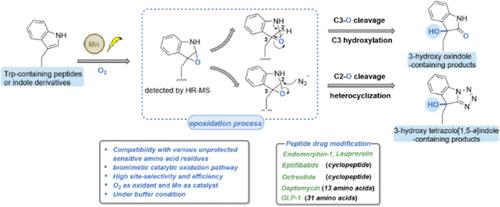Manganese-Catalyzed Electrochemical Oxidation of Tryptophan-Containing Peptides and Indole Derivatives by O2
IF 11.3
1区 化学
Q1 CHEMISTRY, PHYSICAL
引用次数: 0
Abstract
Tryptophan oxidation products derived from the dioxygenation and monooxygenation of tryptophan derivatives exhibit a wide range of biological activities. Nature has evolved finely tuned biosynthetic pathways to oxidize tryptophan derivatives using molecular oxygen (O2) as a co-substrate via enzymatic epoxidation steps. Nevertheless, the strategies involving these metalloenzymes are constrained by substrate specificity and the structural complexity of the enzymes. Driven by the practical demands for chemical conversions, there exists a longstanding quest for bioinspired catalysts guided by biomimetic catalytic principles in chemical transformations. In this regard, we herein present a single-step manganese-catalyzed aerobic electrochemical oxygenation of tryptophan-containing peptides (including peptide drugs) guided by the biomimetic catalytic principles to access the 3-hydroxy-oxindole- or 3-hydroxy-tetrazolo[1,5-a]indole-containing peptides and derivatives with broad functional group tolerances and high site selectivity under buffer conditions. Mechanistic investigations support that Mn-peroxo species are involved in the oxidation and the electricity contributes to the electron-transfer steps in the catalytic loop.

求助全文
约1分钟内获得全文
求助全文
来源期刊

ACS Catalysis
CHEMISTRY, PHYSICAL-
CiteScore
20.80
自引率
6.20%
发文量
1253
审稿时长
1.5 months
期刊介绍:
ACS Catalysis is an esteemed journal that publishes original research in the fields of heterogeneous catalysis, molecular catalysis, and biocatalysis. It offers broad coverage across diverse areas such as life sciences, organometallics and synthesis, photochemistry and electrochemistry, drug discovery and synthesis, materials science, environmental protection, polymer discovery and synthesis, and energy and fuels.
The scope of the journal is to showcase innovative work in various aspects of catalysis. This includes new reactions and novel synthetic approaches utilizing known catalysts, the discovery or modification of new catalysts, elucidation of catalytic mechanisms through cutting-edge investigations, practical enhancements of existing processes, as well as conceptual advances in the field. Contributions to ACS Catalysis can encompass both experimental and theoretical research focused on catalytic molecules, macromolecules, and materials that exhibit catalytic turnover.
 求助内容:
求助内容: 应助结果提醒方式:
应助结果提醒方式:


